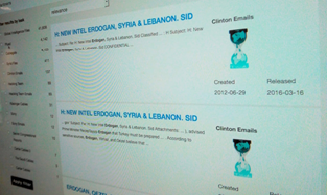Check the latest security incidents happening for you to unite your people, processes, and technologies behind an intelligence-driven defense. Being up to date with latest cyber-attack happening around the globe increases awareness on hackers’ new targets and alerts you on your next move towards cyber security.
Hackers threaten to take Pokemon Go offline August 1 with massive DDoS attack
Poodlecorp has threatened to take the über popular augmented reality game Pokémon Go offline August 1 through a series of distributed denial of service (DDoS) attacks. The group plans to take the servers down for 20-plus hours using the same method they have used on other attacks Poodlecorp has laid claim to — a massive botnet consisting of 600,000 devices ranging from DVRs to dedicated servers.
Polish telecom suffers major data breach following hack
Polish telecom Netia suffered a major data breach following an attack that allowed hackers gain access to 14GB of customer data. Following the incident, which took place on July 7, the company’s website was down until later that day. Netia owns Poland’s second largest fixed phone line, and provides TV, Internet and mobile telephony services to its customers.
Wikileaks hit by hackers after threat to release Turkey cables
Wikileaks has claimed its servers were hit before it released hundreds of thousands of documents purporting to reveal Turkey’s “political power structure”. The site said it would release the documents in the wake of the failed attempt to overthrow President Recep Tayyip Erdogan last week.
Library of Congress hit with a denial-of-service attack
Some of the U.S. Library of Congress’s (LOC) websites are currently inaccessible as the result of a denial-of-service attack, the Library of Congress. The cyberattack was originally detected on July 17. The attack has also caused other websites hosted by the LOC, including the U.S. Copyright Office, to go down.
DDoS attacks continue to grow in frequency and sophistication
With Distributed denial of service (DDoS) attacks continuing to grow in frequency, sophistication and bandwidth. There are numerous reasons for this. For example, DDoS tactics are increasingly targeting vulnerabilities in specific applications, such DNS servers or even Network Time Protocols (NTP) used for syncing date and time between machines on a network, according to Schneier on Security.
Tips to Protect Against DDoS Attacks
Distributed denial of service (DDoS) attacks are able to take out an entire site in a matter of minutes. Firewalls and traditional tools like intrusion detection and prevention systems cannot always mitigate the security risks associated with these threats.
- Do It Yourself. This is the simplest and least effective method. Generally someone writes some Python scripts that try to filter out the bad traffic or an enterprise will try and use its existing firewalls to block the traffic.
- Specialized On-Premises Equipment. This is similar to “Do It Yourself” in that an enterprise is doing all the work to stop the attack, but instead of relying on scripts or an existing firewall, they purchase and deploy dedicated DDoS mitigation appliances. These are specialized hardware that sit in an enterprise’s data center in front of the normal servers and routers and are specifically built to detect and filter the malicious traffic.
- Internet Service Provider (ISP). Some enterprises use their ISP to provide DDoS mitigation. These ISP’s have more bandwidth than an enterprise would, which can help with the large volumetric attacks,
- Cloud Mitigation Provider. Cloud mitigation providers are experts at providing DDoS mitigation from the cloud. This means they have built out massive amounts of network bandwidth and DDoS mitigation capacity at multiple sites around the Internet that can take in any type of network traffic, whether you use multiple ISP’s, your own data center or any number of cloud providers.
Use the latest technology, capable of analyzing, storing and monitoring, in real-time, the security level on your servers, routers, applications, databases, websites. This ability to understand and analyze the observable events occurring within an information system plays a vital role in detecting DDoS attacks and in the construction of a network vulnerability correction plan, to prevent such incidents in the future.
Intrusions happen, threats emerge and your security operation needs to be at its peak efficiency. The SOC products Reveelium and SIEM can quickly intercept threats and thus help in avoiding data breaches. For more information about cyber security kindly contact Anglo African on 2331636 or by e-mail at contact@infosystems.mu





